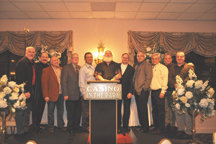Is it a good thing or bad thing for Jersey City to lay off hundreds of employees to potentially save money?
In February, 279 Jersey City provisional and seasonal employees were laid off by the city in order to lessen tackle an estimated $40-plus million shortfall in the $507M budget the City Council must approve before the fiscal year ends on June 30.
The city has also given furloughs of two days per month to many other city employees.
From July 1, 2009 to March 1, a total of 58 city employees have retired, 25 of them since the beginning of this year. Pending state legislation will cap payouts for accrued sick leave at $15,000, but those who retire before then may get hundreds of thousands of dollars that they have banked.
A total of 58 employees who retired were each paid as little as approximately $3,300 and as much as $250,000.
________
The expense to the city from payouts to retirees was made clear last month when the city paid retiring city employees Roger Grego and Kathy Dealy a total of over $370,000 combined for the sick and vacation days they accumulated during their years of service. There was controversy because the two were hired back only days after their Feb. 1 retirement, this time to work as consultants for the Jersey City Public Library (Grego) and Jersey City Municipal Utilities Authority (Dealy). Thus, they were technically able to apply for their payouts and still come back to work for the city. However, the City Council at its Wednesday meeting approved resolutions rescinding the agreements to rehire them.
Some residents fear that there is a great human cost from some of the layoffs, too. For instance, the Jersey City Recreation Department Soccer program was pared down to one coach for over 1,000 participants.
One local user of the public pool at Pershing Field recently questioned, in a letter to the editor, how much money in pool fees will be lost due to reduced hours and reduced lifeguards.
Councilman Michael Sottolano said last week that while the layoffs and retirements could lead to “general reduction in services,” he said it was “premature” to try to pinpoint how the city will suffer.
A longtime city employee said the departments that suffered the most loss of employees included the Recreation Department (151 employees) which also uses many part-time employees for the free summer camp the city holds every year, and the Cultural Affairs Division (over 40 employees), which helps organize and oversee parades and festivals.
Getting out with a payout
City spokesperson Morrill could not tell the Jersey City Reporter how much it’s costing the city to pay severance to the 58 employees who have retired since July 1. A total of 38 retired from either the Police or Fire Departments, and 20 from other posts.
But payout numbers have come out for some of the retirees, and not just Dealy and Grego. Records of payouts obtained by the Reporterthrough a public records request found that the 58 employees were each paid as little as approximately $3,300 and as much as $250,000. The total amount of payouts comes to $5.36 million before taxes.
Payouts for employees from the city’s pension system don’t take long. An application received one month prior to a retirement date results in a payment issued a month after the retirement date, a two-month turnaround. The payments are subject to deductions, including federal and state taxes.
Police and fire officers fall under the state’s pension system, but are paid out by the city for accrued sick leave and vacation time as well. The payout to civilian workers comes from the city’s budget.
Councilman Sottolano, who worked for the city for 38 years until his retirement in 2004, said he sees more retirements coming, and puts the blame squarely on state legislators pushing for the $15,000 cap without accounting for the retirements that would result ahead of time.
“It’s a great example of legislation without looking at impact,” Sottolano said.
Ricardo Kaulessar can be reached at rkaulessar@hudsonreporter.com.
